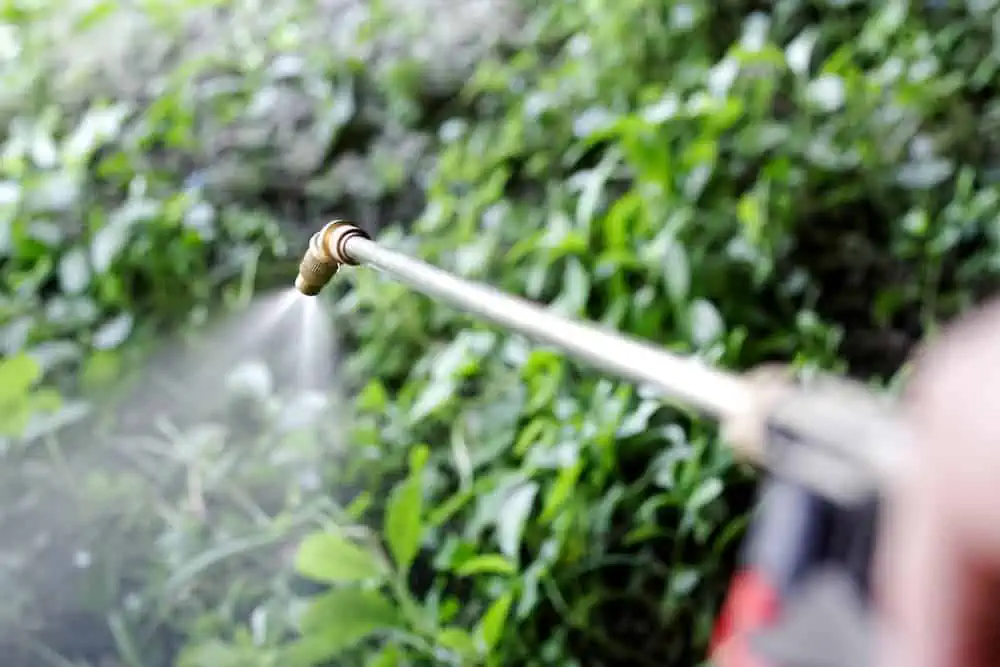What Products Contain Paraquat?
- Last Updated: July 27th, 2023

Attorney Jessica Paluch-Hoerman, founder of TruLaw, has over 28 years of experience as a personal injury and mass tort attorney, and previously worked as an international tax attorney at Deloitte. Jessie collaborates with attorneys nationwide — enabling her to share reliable, up-to-date legal information with our readers.
Legally Reviewed
This article has been written and reviewed for legal accuracy and clarity by the team of writers and legal experts at TruLaw and is as accurate as possible. This content should not be taken as legal advice from an attorney. If you would like to learn more about our owner and experienced injury lawyer, Jessie Paluch, you can do so here.
Fact-Checked
TruLaw does everything possible to make sure the information in this article is up to date and accurate. If you need specific legal advice about your case, contact us by using the chat on the bottom of this page. This article should not be taken as advice from an attorney.
What Products Contain Paraquat?
Paraquat is a highly toxic chemical that has been used as an herbicide by many farmers on crops all around the world since the 1950s.
Because products containing paraquat are both effective and cheap, they are particularly popular in many underdeveloped countries.
However, due to its highly toxic nature and its potentially lethal effects on humans, more than 40 countries have banned its use, including the European Union and China.

In the United States, paraquat products are classified as Restricted Use Pesticides.
They may only be used by trained applicators and are not licensed for home use or for use within residential areas.
Table of Contents
Is Paraquat a Brand Name?
“Paraquat” is short for paraquat dichloride, and it is a generic name for an organic compound that was first synthesized in 1882.
Its first commercial use came in 1962 when the Imperial Chemical Industries in Britain manufactured and sold paraquat under the brand name Gramoxone.
Gramoxone, which is now manufactured by Syngenta, is still the most recognizable brand name of paraquat in the United States today.
What Other Brand Names Contain Paraquat?
The following brand names all contain paraquat:
- Action
- Agroquat
- Agroxone
- Almoxone
- Cap Pelanduk
- Capayam
- Cekuquat
- Crisquat
- Cropoquat
- Cyclone
- Crysquat
- Delta-Quat
- Dextrone X
- Dexuron
- Dragocson
- Efoxon
- Esgram
- Erazone
- Express
- Esgram
- Firestorm
- Galokson
- Goldquat
- Gramex
- Gramix
- Gramixel
- Halexone
- Herbatop
- Herboxon
- Herbikill
- Inferno
- Kapid
- Katalon
- Kemozone
- Kendo
- Ken-Tec
- Kingxone
- Marman
- Herbiquat
- Methyl Viologen Dichloride
- Methyl Viologen
- Multiquat
- Nuquat
- Osaquat
- Paquat
- Para
- Parable
- Paraco
- ParaCol
- Parakill
- Parakwat
- Paranox
- Paraquato
- Paratone
- Paratroop
- Parawin
- Parazone
- Pillarquat
- Pillarxone
- Plusquat
- Priquat
- Prelude
- R-Bix
- Revolver
- Scythe
- Secaquat
- Shirquat
- Sparkle
- Speeder
- Speedway
- Sweep
- Sunaquat
- Total
- Toxer
- Uniquat
- Weedless
Which Companies Manufacture Paraquat Products?
The most well-known manufacturers of paraquat are Syngenta and Chevron, but there are several companies around the world that are involved in producing herbicides that contain paraquat.
Many of the manufacturers of paraquat products are based in China.
Western manufacturers of paraquat products on the market today include:
- Adama Group
- Altitude Crop Innovations
- Chevron Chemical Company
- Drexel Chemical Company
- Helm Agro
- Innvictis Crop Care
- Sinon USA
- Syngenta
- United Phosphorus
How Can I Tell If I Have Been Exposed to Paraquat?
If you believe that you’ve been exposed to a product containing paraquat, it is important to try to confirm this as soon as possible.
In addition to being potentially fatal if ingested (even in tiny quantities), studies have suggested links between paraquat exposure and a much greater risk of developing Parkinson’s disease.
 If you cannot recall having used one of the paraquat products listed above, think about the following:
If you cannot recall having used one of the paraquat products listed above, think about the following:
- If you have had exposure to a fluid with a distinctive blue tint, it may have been a paraquat product. In the U.S., paraquat-containing products are tinted blue in order to avoid confusion with beverages such as coffee or juice.
- If any of the herbicides you have encountered have had a distinctive, unpleasant, pungent smell, you may have been exposed to paraquat.
- Because paraquat is a “restricted use” chemical, the Environmental Protection Agency (EPA) requires applicators to undergo special training and to obtain a license in order to use it. If you have worked for a farm that seemed to have an overly relaxed approach to government regulations, it is possible that paraquat may have been in use in ways that increased the potential for harmful exposure.
Who Is Most at Risk of Exposure to Paraquat?
Even though paraquat is a federally restricted substance, it still has widespread use across the United States.
Thus, there are potentially thousands of people who are at risk of acquiring the potential long-term consequences associated with paraquat, including Parkinson’s disease.
Those most affected by paraquat exposure may be agricultural workers who have handled the substance directly.
However, it is possible that you have had exposure to the chemical even if you have never worked or lived on a farm.
This is because people who live and work in areas near farms that use paraquat may encounter it due to runoff, drift, or “crop duster” overspray.
You may be at a particularly high risk of exposure if you fall into any of the following categories:
- Farm workers
- Herbicide applicators (including both handheld and tractor)
- Farm owners
- Owners and workers of farms adjacent to those using paraquat
- Property owners living near farms using paraquat
- Schoolchildren
Because of the herbicide’s purported links with Parkinson’s disease, people who are members of the above populations are among those involved in the hundreds of lawsuits in ongoing Multidistrict Litigation (MDL) against companies who manufacture products containing paraquat.
As of April 2022, there are currently 982 paraquat lawsuits in the MDL class action.
If you believe you or a loved one was exposed to toxic pesticides including any of the brands listed above, you may be entitled to compensation for pain and suffering, medical expenses, and lost wages.
TruLaw and their attorneys are investigating paraquat lawsuits today.
Use our instant Case Evaluation tool to learn if you are eligible to file a lawsuit against the manufacturer of paraquat today.

Managing Attorney & Owner
With over 25 years of legal experience, Jessica Paluch-Hoerman is an Illinois lawyer, a CPA, and a mother of three. She spent the first decade of her career working as an international tax attorney at Deloitte.
In 2009, Jessie co-founded her own law firm with her husband – which has scaled to over 30 employees since its conception.
In 2016, Jessie founded TruLaw, which allows her to collaborate with attorneys and legal experts across the United States on a daily basis. This hypervaluable network of experts is what enables her to share the most reliable, accurate, and up-to-date legal information with our readers!
Here, at TruLaw, we’re committed to helping victims get the justice they deserve.
Alongside our partner law firms, we have successfully collected over $3 Billion in verdicts and settlements on behalf of injured individuals.
Would you like our help?
At TruLaw, we fiercely combat corporations that endanger individuals’ well-being. If you’ve suffered injuries and believe these well-funded entities should be held accountable, we’re here for you.
With TruLaw, you gain access to successful and seasoned lawyers who maximize your chances of success. Our lawyers invest in you—they do not receive a dime until your lawsuit reaches a successful resolution!
AFFF Lawsuit claims are being filed against manufacturers of aqueous film-forming foam (AFFF), commonly used in firefighting.
Claims allege that companies such as 3M, DuPont, and Tyco Fire Products failed to adequately warn users about the potential dangers of AFFF exposure — including increased risks of various cancers and diseases.
Depo Provera Lawsuit claims are being filed by individuals who allege they developed meningioma (a type of brain tumor) after receiving Depo-Provera birth control injections.
A 2024 study found that women using Depo-Provera for at least 1 year are five times more likely to develop meningioma brain tumors compared to those not using the drug.
Suboxone Tooth Decay Lawsuit claims are being filed against Indivior, the manufacturer of Suboxone, a medication used to treat opioid addiction.
Claims allege that Indivior failed to adequately warn users about the potential dangers of severe tooth decay and dental injuries associated with Suboxone’s sublingual film version.
Social Media Harm Lawsuits are being filed against social media companies for allegedly causing mental health issues in children and teens.
Claims allege that companies like Meta, Google, ByteDance, and Snap designed addictive platforms that led to anxiety, depression, and other mental health issues without adequately warning users or parents.
Transvaginal Mesh Lawsuits are being filed against manufacturers of transvaginal mesh products used to treat pelvic organ prolapse (POP) and stress urinary incontinence (SUI).
Claims allege that companies like Ethicon, C.R. Bard, and Boston Scientific failed to adequately warn about potential dangers — including erosion, pain, and infection.
Bair Hugger Warming Blanket Lawsuits involve claims against 3M — alleging their surgical warming blankets caused severe infections and complications (particularly in hip and knee replacement surgeries).
Plaintiffs claim 3M failed to warn about potential risks — despite knowing about increased risk of deep joint infections since 2011.
Baby Formula NEC Lawsuit claims are being filed against manufacturers of cow’s milk-based baby formula products.
Claims allege that companies like Abbott Laboratories (Similac) and Mead Johnson & Company (Enfamil) failed to warn about the increased risk of necrotizing enterocolitis (NEC) in premature infants.
Here, at TruLaw, we’re committed to helping victims get the justice they deserve.
Alongside our partner law firms, we have successfully collected over $3 Billion in verdicts and settlements on behalf of injured individuals.
Would you like our help?












